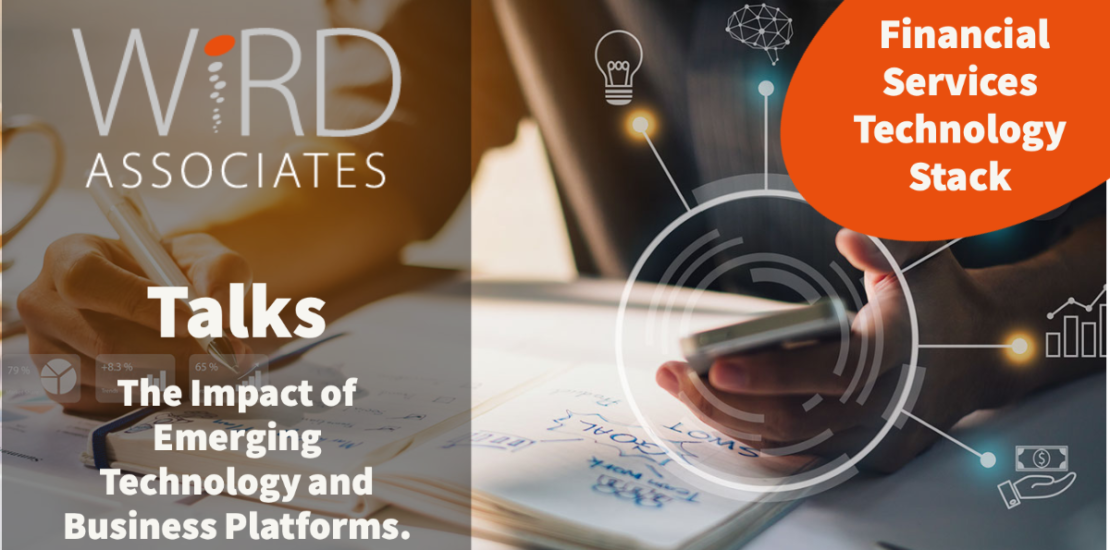- 2023-05-17
- Posted by: Adrian Williams
- Categories: Business plans, Finance & accounting, Software

How will the use of technology and business platforms influence the Financial Services Technology stack?
The financial services industry is undergoing a significant transformation driven by emerging technologies and innovative business platforms. These advancements are reshaping the financial services technology stack, empowering organisations to deliver enhanced customer experiences, streamline operations, and data drive innovation. In this blog, we will explore how emerging technologies and business platforms are impacting the financial services technology stack.
What are Technology and Business platforms and how are they influencing the Financial Services Technology stack?
Financial Services technology and business platforms are in essence fully contained technology frameworks that host the Financial Services solutions and services needed to operate a financial organisation. Each solution is fully independent but loosely coupled where necessary to other solutions or technology environments. This enables much closer collaboration both within a financial organisation as well as with third party financial services providers. Each platform will support one or more of the solutions/capabilities listed below.
Fintech Startups and Disruptive Innovation: The rise of fintech startups has brought disruptive innovation to the financial services industry. These agile and technology-driven companies are leveraging emerging technologies such as artificial intelligence (AI), blockchain, and cloud computing to offer innovative financial products and services. Fintech startups often operate on scalable business platforms that integrate seamlessly with existing financial systems through APIs. The collaboration between traditional financial organisations and fintech startups is fuelling innovation and driving the evolution of the financial services technology stack.
Open Banking and APIs: Open Banking, enabled by the use of Application Programming Interfaces (APIs), is transforming the way financial organisations operate and interact with customers. APIs allow secure and standardised data sharing between financial organisations and third-party providers, creating a more interconnected ecosystem. This integration enables customers to access a broader range of financial products and services from multiple providers through a single platform. Open Banking promotes innovation, fosters competition, and encourages collaboration, leading to the creation of innovative solutions and a more seamless customer experience.
Artificial Intelligence and Machine Learning: Artificial Intelligence (AI) and Machine Learning (ML) technologies are revolutionising various aspects of the financial services technology stack. AI-powered chatbots and virtual assistants are improving customer interactions and enabling self-service options. ML algorithms are analysing vast amounts of financial data to detect patterns, automate decision-making processes, and enhance risk management strategies. AI and ML also play a crucial role in fraud detection, anti-money laundering efforts, and personalised marketing campaigns. These technologies drive efficiency, reduce costs, and enable financial organisations to deliver personalised and data-driven services.
Blockchain and Distributed Ledger Technology (DLT): Blockchain and Distributed Ledger Technology (DLT) have the potential to revolutionise the financial services industry by offering enhanced security, transparency, and efficiency. Blockchain technology provides a decentralised and immutable ledger that ensures secure and transparent transactions. It enables faster and more secure cross-border payments, simplifies trade finance processes, and facilitates the tokenisation of assets. Financial organisations are exploring the use of blockchain and DLT to streamline operations, reduce costs, and eliminate intermediaries.
Cloud Computing software-as-a-service (SaaS) and Infrastructure-as-a-Service (IaaS): Cloud computing is revolutionising the financial services technology stack by providing scalable infrastructure, cost savings, and agility. Financial institutions can leverage cloud-based solutions for data storage, processing, and analysis. The cloud also facilitates the adoption of Software-as-a-Service (SaaS) solutions and Infrastructure-as-a-service solutions (IaaS), enabling quick deployment of applications and infrastructure and reducing the need for on-premises infrastructure. Moreover, the cloud’s elasticity allows financial institutions to scale their operations based on demand.
Robotic Process Automation (RPA): Robotic Process Automation (RPA) is automating repetitive and rule-based tasks within the financial services industry. RPA bots can handle activities such as data entry, reconciliation, compliance checks, and report generation. By automating manual processes, financial organisations can reduce costs, minimize errors, and free up human resources for more complex and value-added tasks. RPA enhances operational efficiency and enables financial organisations to deliver faster and more accurate services to their customers.
Internet of Things (IoT): The Internet of Things (IoT) is generating a wealth of data that can be harnessed by the financial services industry. IoT devices, such as wearables and connected vehicles, provide real-time data on customer behaviour, enabling personalised insurance offerings and risk assessment. Furthermore, IoT devices can enhance fraud detection by monitoring anomalies in transactions and user behaviour. By leveraging IoT data, financial institutions can deliver tailored services and mitigate risks more effectively.
Platform Economy and Ecosystems: The rise of platform-based business models is transforming the financial services landscape. Platform businesses bring together buyers, sellers, and service providers, creating ecosystems that facilitate transactions and value exchange. These platforms enable financial institutions to reach a broader customer base, offer innovative services, and collaborate with other industry players. Platform economy also paves the way for new revenue streams and partnerships, fostering innovation and driving growth.
Emerging technologies and business platforms are revolutionising the financial services technology stack, reshaping the industry’s landscape, and opening up new opportunities. Blockchain, AI, open banking, cloud computing, IoT, and platform economies are driving unprecedented innovation, efficiency, and customer-centricity. Financial institutions that embrace these technologies and leverage the power of technology and business platforms will be well-positioned to thrive in the dynamic and evolving financial services industry of the future.
In WiRD’s experience, platform based Financial Technology stack solutions are gaining the “lion’s share” of attention across most financial organisations at the moment. It is seen as crucial to ongoing Financial Services sector differentiation and market growth. What is your experience in this regard? How important is platform-based technology stack solution in your organisation? Please share your experiences with WiRD and each other by commenting or interacting on LinkedIn
